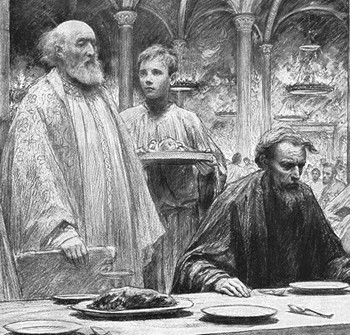The struggle between Good and Evil is one that humanity has been dealing with from the first moments of time. It doesn't take much to recognize the presence of evil in our world. Evil has had the most successful advertising campaign in history. We find it much more difficult to see God's invitation to Love and to respond to it.

"The kingdom of heaven may be likened to a king who gave a wedding feast for his son." We have heard these words so often throughout our lives that we sometimes take them for granted. But to really appreciate this parable we have to see it as our story. We need to know that we have been the recipients of God's gracious hospitality and generosity. And not because of any good we may have done. We can claim no right but we should feel privileged to find ourselves in the banquet hall. We are from the highways and byways no longer. We are honored guests.
It should make a difference in our lives, don't you think? We have all received the invitation - an invitation not to a banquet, to but to life in its fullness. And if God is so willing to give of Himself so totally to us, what then is our responsibility in accepting that invitation?
The "life" that Jesus is talking about is much more than mere physical existence. It goes beyond the banquet of Isaiah’s vision and that of Matthew’s parable. Jesus clearly means the "God-life" to which we are called by creation, by redemption, by sanctification. Jesus lived among us, died and rose again so that we would each realize to the full His Father's gift of Life and Love. We come together as a community of faith for precisely the same purpose. So, in all that we do, individually and communally, we should be life-givers, life-enhancers. All of us who have been "invited to the banquet" should be more fully alive because of what we do in response to the invitation. And our constant message to all - to family and friends, to strangers and enemies, to young and old, to the ill and the healthy, to the rich and the poor - should be to share this LIFE with us, fully, completely, now and always.
The stress level for most people in contemporary society is almost unbearable. Young people are faced with decisions and challenges that wring their very souls: choices concerning school and work, sex and money, freedom and obligations, drugs and liquor. Young married couples face the grueling routine of commuting, competition, pressures on the job, demands from children, economic and financial crises, strained relationships, and hunger for satisfaction and success. The aging are tormented by fears of illness, loneliness, uselessness, and financial insecurity. The burdens of life sometimes just seem too heavy. We are living in a broken world in need of healing.
How does faith deal with crisis? Paul says simply: “I can do all things in him who strengthens me.” This then is the answer. If we truly understand the precious gift of God's Love, then we can live each day in the absolute assurance that the Risen Lord Jesus Christ lives in us and through us. His strength is our strength. His victory is our victory.
Jesus’ life put flesh on this parable. When he sat at table with the poor, outcasts and sinners, he was showing what this parable looked like. All were welcomed into his company and would be welcomed at the banquet in God’s realm. Who gets to sit at the table with the Lord? The parable says anyone who responds to the free invitation, even the outsiders. But those who get in must make a fitting response that indicates they realize what has been given them.
This means that we must try to act honestly, compassionately, justly and with love at the places we live and work and in all we do. We need to recognize the presence of evil in this world and with the assurance of God's Love, move forward.
Without a proper response to the invitation we are no longer at a banquet, but simply “out to lunch.” Without an authentic RSVP to the invitation we might just be asked: “My friend, how is it that you came in here without a wedding garment?”





